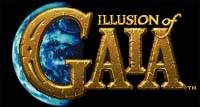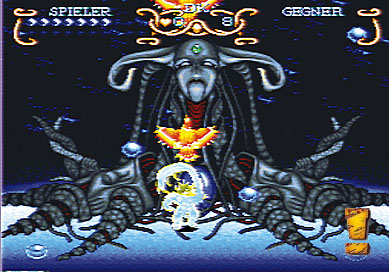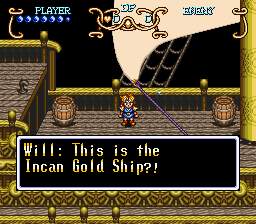|
|

|
BATTLE SYSTEM
|

|
INTERACTION
|

|
ORIGINALITY
|

|
STORY
|

|
MUSIC & SOUND
|

|
VISUALS
|

|
CHALLENGE
|
Unthreatening
|
COMPLETION TIME
|
11-17 hours
|
|
OVERALL
4.0/5
|
Rating definitions
|
|
|
Soul Blazer was an interesting Action-RPG entry in the early years of the Super Nintendo. It was unpolished but had a number of interesting features, the most novel of which was the playerís need to rebuild the world by freeing its inhabitants from imprisonment. This feature is dumped in Soul Blazerís spiritual successor Illusion of Gaia, along with many of the other less distinctive features of that game. Illusion of Gaiaís substitutions for these absences are not necessarily better than those present in Soul Blazer, but the game manages to be an entertaining play despite dispensing with most of the features its predecessor exhibited.
Soul Blazer, Illusion of Gaia and Terranigma are reasonably well-known as forming a trilogy of sorts on the SNES from Enix. An incredibly loose trilogy it is, however, as the battle system from Soul Blazer has changed quite a bit. The basics of having a protagonist walk around and attack enemies in real time have stayed the same Ė but as this describes 90% of Action-RPGs the definition helps no one. Experience is gone; in its place the player is given an incentive to kill everything. Enemies do not resurrect, and once all enemies in an area are dead the player will be granted a statistic increase in HP, offense, or defense. There is no such thing as magic in Illusion of Gaia, its place being taken by special moves learned by the player as the game progresses. Each of these special moves is vital to further progress. Most of the special moves also damage enemies.
 This is actually an enormous spoiler moment Ė but since itís in German I absolve myself of responsibility
This is actually an enormous spoiler moment Ė but since itís in German I absolve myself of responsibility
|
|
There is also the ability, nay, necessity of changing the playable character. The player begins the game as a young man named Will, and all areas without combat will be navigated as Will. After a certain point Will can change into the dark warrior Freedan, and much later into the ethereal fighter Shadow within the Dark Space that enables saving. Each of them has certain abilities enabling access of areas that the others cannot reach.
Transformation is accomplished easily; conversation with other people is also easy. The interaction within Illusion of Gaia is plagued by only one handicap: a strict limit of 16 to the items that can be held at any one time. This limit will not be too crippling, as not many items exist in the game, but the finite number of healing herbs in the game (which are the only means of healing without a Dark Space nearby) means that they must all be preserved for dire need. There are no weapons or armor to equip, and no money in the game; some of the sources of annoyance because of poor interaction in other RPGs from this time period are gone from this title. Unless one is perturbed by the very significant periods of time in which the plot advances at the expense of any player involvement: more on that later.
Visually Illusion of Gaia clearly hails from the time period when developers had a good idea of what the SNES could do. It also lacks some of the truly impressive graphical feats that Final Fantasy VI in the same year would show could be done on the system; while the sprites look good, they donít look outstanding and nothing they do really pushes the SNES. Similarly, the audio sounds good without standing out too much. Many of the compositions are quite catchy while the game is playing, and nothing immediately comes to mind as a bad piece.
 Let us ignore the many historical fallacies present in this text, such as the Inca never being known for seafaring ability along with gold making for a very poor shipbuilding material. Oops.
Let us ignore the many historical fallacies present in this text, such as the Inca never being known for seafaring ability along with gold making for a very poor shipbuilding material. Oops.
|
|
Coming to the story in Illusion of Gaia, it begins with the aforementioned Will hanging out with three classmates after school. They interact for awhile, and then someone new pops into town Ė young Kara and her pet pig Hamlet. Kara turns out to be Princess Kara, and is extricated back to the environs of her fatherís castle. Will for some reason gets it into his head to go help her after a royal summons is made, and is thrown into the dungeon by an irritable monarch. From here it moves on to ancient Incan temples and the Great Wall of China, among other things. And never fear, because the story takes up a very high percentage of the playing time for an Action-RPG released in 1994. So much time is taken up that the ability to run around fighting things will often be viewed joyfully, as it means the constant yammering by NPCs will cease. Translation-wise the game is functional without being particularly elegant Ė many plot points seem inadequately developed, which can either be blamed on the original writing or on the translator not getting the correct intonation down. Illusion of Gaia is not very long, and could probably be completed in one long day if an RPGamer wanted to make the effort. The only reason for replay is a side quest that grants an extra area to explore and makes certain connections with Soul Blazer far more recognizable. This extra area certainly isnít the greatest part of the game but is better than nothing. As for challenge, Illusion of Gaia has all enemies drop a heart upon defeat, and 100 hearts means upon death the player will restart the area with half-health instead of getting a Game Over. As there are few areas unpleasant enough to make death a real possibility save through inattention, this system should serve to make the gameís areas navigable without excessive stress. Bosses are big and nasty but, except for the Vampire duo, probably will not require a great amount of skill to destroy once their patterns are deduced.
Illusion of Gaia has a few too many scenes with people talking for long periods, but in combat it is quite enjoyable. Hardly enough to topple The Legend of Zelda: A Link to the Past as the top SNES Action-RPG, but for any RPGamer seeking a worthy title in this vein, Gaia will serve. The game is not overly challenging, its story is interesting if poorly paced, and the combat is entertaining to partake of. Is there anything more to say? Not by me.
Review Archives
|









